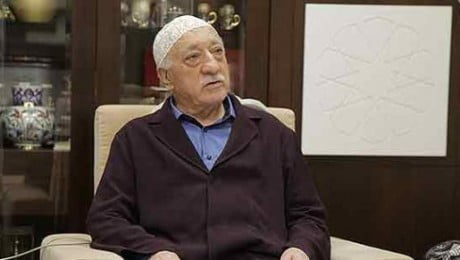Keyword: Fethullah Gulen

Lawyers to Trump: Don’t pressure judges in Turkey extradition case
“The extradition process is a serious one, governed by [a] treaty with Turkey that is clear about the steps that need to be taken in such cases. It should not be a political matter,” the lawyers wrote. “The United States has strong democratic institutions, including its judiciary system, where these high-level issues are handled. We expect and are confident that will be the case in the next administration.”

Detainees ‘beaten, sexually abused and threatened with rape’ after Turkey coup, Human Rights Watch claims
In a 43-page report published on Tuesday, the human rights group said a “climate of fear” had prevailed since July’s failed coup against President Tayyip Recep Erdogan and the arrest of thousands under a state of emergency.

Gulen’s new book: “Muslims’ Responsibility in Countering Violence”
The extracts in this booklet have been selected according to the current volume’s theme from among Gülen’s books already published in Turkish. Some of them have been translated into English before but most of the extracts have been translated into English and arranged into different chapters in the present volume. Some of the texts are revised and altered by Fethullah Gülen himself.

Turkish mob boss to gov’t: Why bother with diplomacy? We’ll kill Gülen, his followers
Turkey’s infamous mob boss Alaattin Çakıcı implied in a letter to the Justice Ministry that his mafia network could kill Islamic scholar Fethullah Gülen in Pennsylvania and his senior followers elsewhere in the world. Çakıcı’s letter came weeks after Turkey’s controversial request that the US extradite Gülen.

Why Gulen Should Not Be Extradited
To extradite Gulen would not only imply a high chance of an unfair trial, but would also sound the death knell of a blueprint for global peace. Gulen’s ideas have all the potential for a global approach to peace-building. John L. Esposito, a professor at Georgetown University and a highly respected expert on Islam, called Gulen’s initiatives “extraordinarily unique”, and suggested it would be “wise” for other Muslim movements to emulate them.

Turkish ambassador leads an unrealistic mission: bringing a reclusive Muslim cleric before Turkish courts
Although Turkey immediately blamed Gulen for the coup attempt, it took Ankara nearly six weeks to make a formal request for his extradition — and that was based on earlier alleged crimes, not for his supposed role in the coup.

You can’t achieve democracy through military coup – Islamic scholar
“Once again, the Turkish media, under government control or pressure, is circulating horrific rumours, this time about a supposed second coup attempt in the works, supposedly prepared by my sympathizers with the backing of the United States. Such rumours are unfounded and irresponsible,” Gülen said.

Pro-government paper claims with photoshopped image that Gülen has Vatican passport
In one more of a series of fabricated reports, the pro-government Takvim newspaper ran a lead story on Saturday claiming that Muslim scholar Fethullah Gülen holds a passport from the Vatican since he receives instructions from the Catholic Church. It was discovered that an image of a Vatican passport found on Google was photoshopped by Takvim daily.

AfSV Statement on the Turkish government’s detainment of Kutbettin Gülen
News of the detention of Kutbettin Gülen, the brother of Fethullah Gülen, is as unsurprising as it is troubling, and it is yet the latest example of the Turkish government’s persecution of innocent citizens in the wake of the July 15 coup attempt. Kutbettin Gülen has been detained on trumped-up charges used by President Tayyip Erdoğan’s administration to silence dissent and cement his autocratic hold on power.

Princeton professor accuses Gulen of orchestrating Turkish coup, Harvard professor disagrees
Edward Owen, professor of Middle East history at Harvard, said that he did not believe in Reynold’s certainty of Gülen’s guilt. Owen added that when a person writes “alarmist pieces” like Reynolds’, the main audience for the pieces is Washington. “It is a way of calling attention to yourself, and I imagine that Professor Reynolds would like his name registered by the people in Washington as somebody to go to, to employ, when there is a change in administration in Washington,” Owen said.

Report: Turkey Mulling Attack On Fethullah Gulen
Turkish security services have reportedly been planning an attack on U.S.-based preacher Fethullah Gulen, a Turkish cleric suspected of masterminding the July 15 coup plot, a number of sources confirmed. The source said a Turkish intelligence unit in the U.S. had been monitoring the Gulen’s compound for several weeks and that the security was easy to breach.




















